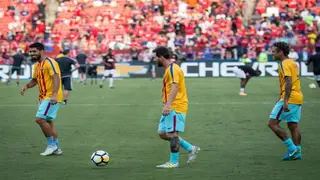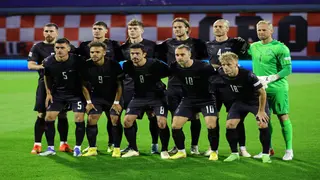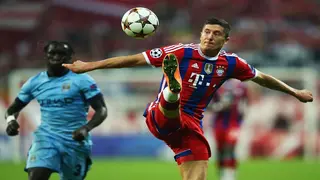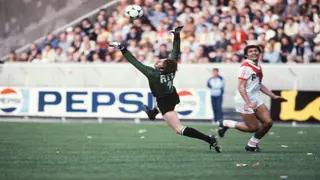Ranking the 10 best attacking trios in football history
Football

Franz Beckenbauer, one of football's iconic figures and a rare World Cup winner as both player and coach, revolutionised the way the game is played.
Born in Munich in 1945, he helped establish Bayern as Germany's strongest club. At international level, he played a key role in Germany becoming a footballing powerhouse.
Known in Germany as "the Kaiser", Beckenbauer played a central role in some of the country's greatest sporting achievements.
Beckenbauer, a commanding figure on and off the pitch, was named European footballer of the year in both 1972 and 1976.
His legacy was later tarnished for his involvement in scandals surrounding Germany's successful bid to host the 2006 World Cup, but he remained football-mad Germany's most celebrated player.
As a player, Beckenbauer revolutionised the role of a defender as a creative playmaker, kick-starting a fundamental tactical shift which remains in force in modern football.
Ranking the 10 best attacking trios in football history
Football
Alongside Brazil's Mario Zagallo, who passed away on Friday aged 92, and France's Didier Deschamps, Beckenbauer is one of only three men to have won the World Cup as both a player and a manager.
Debuting for his country in 1965, Beckenbauer played at the 1966 World Cup as an attacking midfielder. He scored four times as West Germany made it to the Wembley final, where they lost 4-2 to England.
Four years later in Mexico, Beckenbauer scored West Germany's first as his side came from 2-0 down to defeat England 3-2 in the quarter-finals.
In the semis, Beckenbauer dislocated his shoulder after a tackle from Italian defender Pierluigi Cera. Demonstrating his toughness, he returned to the field, playing the remainder of the game in a sling as West Germany lost 4-3 in extra time.

His World Cup disappointment would end on home soil when Beckenbauer captained West Germany to the 1974 title, beating the Netherlands 2-1 in the final in his home city of Munich.
Denmark's World Cup squad: Which players will be booting up for the Danish Dynamites in Qatar?
Football
Retiring at international level in 1977, Beckenbauer took over as coach in 1984, and managed the team that beat Argentina 1-0 in Rome to lift the trophy at Italia '90.
His record in club football was similarly outstanding.
Beckenbauer made 424 appearances in the Bundesliga, scoring 44 goals, mostly in a 13-year spell for Bayern, where he won four German titles and three European Cups.
He won another German title with Hamburg in 1982, before joining Pele at New York Cosmos, where he finished his playing career in 1983.
Beckenbauer had stints as manager in club football at both Bayern and Marseille, winning the French league title in 1991 and the Bundesliga in 1994.
In 1996, he stopped coaching and his role as president of Bayern led to a place on the Executive Committee with football's governing body FIFA.
Beckenbauer had heart surgery in 2016 and again in 2017, when worrying news about his ill health began to emerge.
Who are the ranked top 10 all-time top scorers of the Bundesliga?
Football
German magazine Spiegel claimed in 2017 "his condition had deteriorated massively since April; his judgement and memory are very clouded."
In recent years, Beckenbauer made few public appearances and missed the World Cup in Qatar in 2022 with an ocular issue that cost him his vision in his right eye.
In August 2023, Lothar Matthaeus, part of Beckenbauer's 1990 World Cup-winning side, told a private function his former manager "is not doing so well in terms of health".
Off the field, Beckenbauer led Germany's successful bid to host the 2006 World Cup.

He later became head of the organising committee and the successful tournament is still nostalgically referred to in Germany as "das Sommermaerchen" -- 'The summer fairytale'.
However, the story turned sour in October 2015 when German magazine Spiegel broke the cash-for-votes scandal story.
The magazine alleged that, in 2000, the German Football Association (DFB) had bought the votes of four Asian members of FIFA's 24-strong executive committee to secure the hosting of the 2006 World Cup finals.
Who are the top 10 all-time top scorers in the history of Ligue 1?
Football
Germany beat South Africa with 12 votes to 11 after New Zealand's Charles Dempsey abstained in the final ballot.
"I have not sent anyone money to acquire votes for the awarding of the 2006 World Cup to Germany," said Beckenbauer at the time, while the DFB also strenuously denied the claims.
"And I'm sure that no other member of the bidding committee did either."
In 2019, Swiss prosecutors charged three former German Football Association (DFB) officials, including ex-president Theo Zwanziger, with fraud relating to the 2006 World Cup but left out Beckenbauer's name.
Proceedings against him were set apart as prosecutors deemed him "unable for health reasons to participate or to be questioned" in court.
The unanswered Swiss accusations of fraud, criminal mismanagement, money laundering and misappropriation against Beckenbauer tarnished "Kaiser Franz's" once-glittering image.